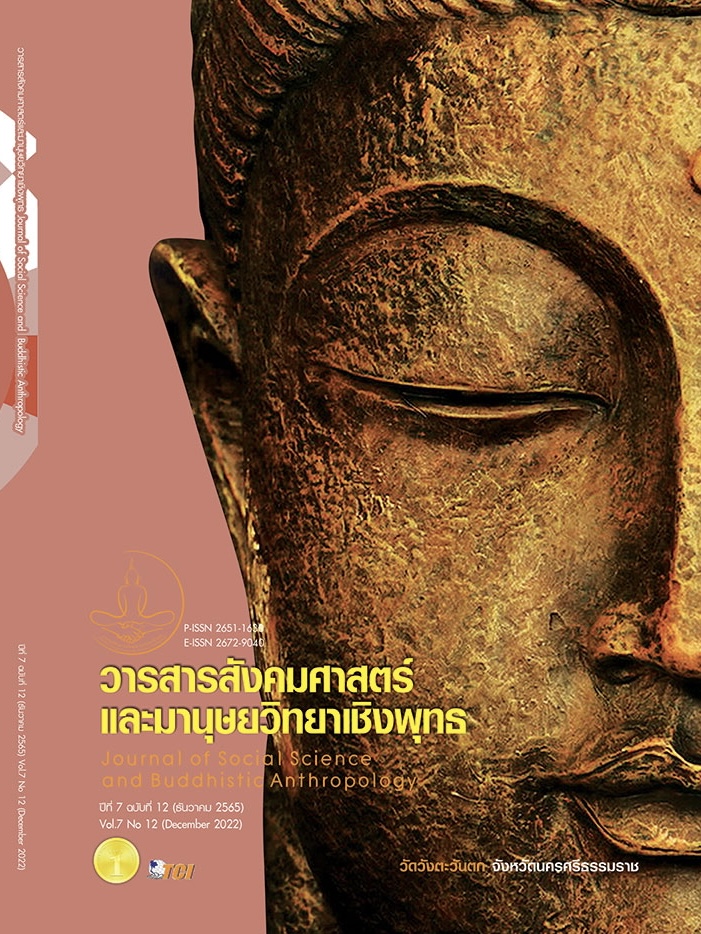THE MODEL DEVELOPMENT OF LEARNING CENTER BASED ON CHANTA EDUCATION APPROACH TO PROMOTE LIFE SKILLS IN DIGITAL ERA
Keywords:
Learning Center, Chanta education, Life Skill Digital EraAbstract
The purpose of article research aimed to develop of learning education center based on Chanta education approach to promote life skills in digital era. The research procedure was divided into two steps. The first step was to study the model examples through Chanta Education approach to enhance life skills in digital era by synthesis of relevant research documents and also structured in-depth interview. The content analysis method was used to analyze all the collecting data. The second step was to develop learning education center based on Chanta education approach and components analysis. The developed learning education center based on Chanta education approach was verified by using the index of item objective congruence (IOC). The finding revealed that the developed learning education center based on Chanta Education approach to promote life skills in digital era comprised four components as follows: 1) Input that consists of learners, instructors and parents 2) Process that is provided by learning management system, courseware, environment, interaction and evaluation 3) Output contributes from five life skills in the digital era: self-concept, data management, decision making, applying of technology and teamwork skills and 4) Feedback to improve. In term of the results of the evaluation through the IOC of the developed learning education center model was 0.95 which is appropriate and can be utilized to establish a learning education center based on Chanta Education approach to promote life skills in digital era in the future.
References
กันย์สินี ปัญญาอภิวงศ์. (2558). ทักษะชีวิตเพื่อการจัดการตนเองตามปรัชญาของเศรษฐกิจพอเพียงของ นักศึกษามหาวิทยาลัยศิลปากร. วารสารสาขามนุษยศาสตร์ สังคมศาสตร์ และศิลปะ, 8(1), 138-152.
ชลาภรณ์ สุวรรณสัมฤทธิ์. (2560). การพัฒนารูปแบบห้องเรียนเสมือนจริงเพื่อส่งเสริมทักษะปฏิบัติตามหลักทฤษฎีพหุปัญญา สำหรับนักเรียนอาชีวศึกษา. ใน รายงานการวิจัย. มหาวิทยาลัยสุโขทัยธรรมาธิราช.
ทิศนา แขมมณี. (2558). ศาสตร์การสอน : องค์ความรู้เพื่อการจัดกระบวนการเรียนรู้ที่มีประสิทธิภาพ. (พิมพ์ครั้งที่ 19). กรุงเทพมหานคร: สำนักพิมพ์แห่งจุฬาลงกรณ์มหาวิทยาลัย.
พระธรรมปิฎก (ป.อ. ปยุตโต). (2542). พุทธธรรม. กรุงเทพมหานคร: โรงพิมพ์มหาจุฬาลงกรณ์ราชวิทยาลัย.
พระมหาพินิจ พรมวิจิตร. (2562). การพัฒนารูปแบบการเรียนรู้บูรณาการแนวคิดเชิงพุทธและแนวคิดการใช้สมองเป็นฐานเพื่อเสริมสร้างทักษะชีวิต. วารสารเกษมบัณฑิต, 20(ฉบับพิเศษ), 23-35.
พัทธนันท์ บุตรฉุยและพันทิพา อมรฤทธิ์. (2565). การพัฒนารูปแบบการจัดการเรียนรู้ในสภาพแวดล้อม อีเลิร์นนิงแบบมีปฏิสัมพันธ์ตามแนวคิดการเรียนรู้เชิงรุกเพื่อส่งเสริมทักษะการคิดขั้นสูงของนักศึกษาระดับบัณฑิตศึกษาในระบบการศึกษาทางไกล. ใน รายงานการวิจัย. มหาวิทยาลัยสุโขทัยธรรมาธิราช.
วรพจน์ วงศ์กิจรุ่งเรือง. (2561). คู่มือพลเมืองดิจิทัล. กรุงเทพมหานคร: สำนักงานส่งเสริมเศรษฐกิจดิจิทัล กระทรวงดิจิทัลเพื่อเศรษฐกิจและสังคม.
วรวรรณ เหมชะญาติ. (2556). ศูนย์การเรียนรู้ : พลวัตแห่งการเรียนรู้สำหรับเด็กอนุบาล. ใน เอกสารประกอบการสอน. จุฬาลงกรณ์มหาวิทยาลัย.
สำนักงานการศึกษาขั้นพื้นฐาน. (2554). แนวทางการพัฒนาทักษะชีวิตบูรณาการการเรียนการสอน 8 กลุ่มสาระการเรียนรู้ หลักสูตรแกนกลางการศึกษาขั้นพื้นฐาน พุทธศักราช 2551. กรุงเทพมหานคร: โรงพิมพ์ชุมนุมสหกรณ์การเกษตรแห่งประเทศไทย.
สำนักงานการศึกษาขั้นพื้นฐาน. (2563). แนวทางการพัฒนาระบบประกันคุณภาพการศึกษาตามกฎกระทรวงศึกษาธิการ. กรุงเทพมหานคร: โรงพิมพ์ชุมนุมสหกรณ์การเกษตรแห่งประเทศไทย.
สำนักงานเลขาธิการสภาการศึกษา. (2560). แผนการศึกษาแห่งชาติ พ.ศ. 2560–2579. กรุงเทพมหานคร: บริษัทพริกหวานกราฟฟิคจำกัด.
Swift, K. (2021). Life Skills. London: Dorling Kindersley Limited.
Weidinger, W. (2015). FACE : Improve your self-esteem and work together Training booklet for teachers. Switzerland: Zurich University.
Downloads
Published
How to Cite
Issue
Section
License
Copyright (c) 2022 Journal of Social Science and Buddhistic Anthropology

This work is licensed under a Creative Commons Attribution-NonCommercial-NoDerivatives 4.0 International License.









